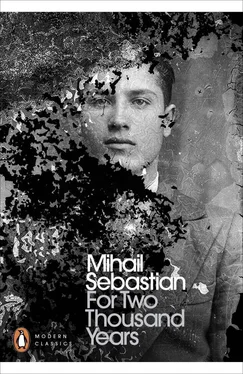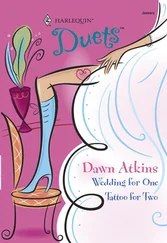There are other rules of conduct at the Central. Don’t do more than raise a finger to greet someone. Under no circumstances, if you wear a hat, must you take it off. Everybody on first-name terms. But don’t formally introduce yourself to anybody. As a rule, everybody here knows everybody. There’s no time for politeness, lies, frivolity. We’re tired — right? — we’re fed up. Rich people, important people, people with pot bellies can fool about all they like. They’ve the time and inclination for joking around. Not us.
There’s a heavy air of boredom and futility at the Central, despite the constant hubbub. If these fellows aren’t busy being passionate, then they’re pretending to be, if they’re not discouraged, then they play at it. Some of them are very young, aggressive and loud, with pubescent rashes on their faces, young agitators who still haven’t found a job to do. Scattered among them is the occasional attractive adolescent face. There are also a few recent beards and moustaches that are deliberately unkempt, sombre and prophetic. (The abundance of beards in periods of social unrest, times of revolt or upheaval, should be noted. It’s the handiest way people have of making themselves mysterious.)
Once inside, it’s hard to leave the Central. Indolence grips you, the dishonest notion that you’re waiting for someone when in fact you’re expecting nobody, you’re just fed up with walking the streets aimlessly. The revolving door spins endlessly, bringing in the same characters. They come and go, then five minutes later they’re back at the same table they left. There’s an air of somnolence, stuffiness, dissipation, a taste of ash, a memory of cigarette-ends.
Occasionally there’s a heated exchange of ideas or fists at one or other of the tables, and everyone is briefly shaken from their torpor. Then the passing fuss subsides again in the constant dull din of voices.
There’s a bearded twenty-year-old from Bessarabia who’s supposedly a blacksmith’s son and a genius. He’s translated Alexander Blok and from time to time he comes to life by trumpeting a verse from ‘The Scythians’.
*
I came across Vally on her own, leaning back against the bar and watching nothing in particular through half-closed eyes, as though through a thick cloud of cigarette smoke. She’s a beautiful girl and her sleek fringe gives her an amiable air which the cigarette doesn’t entirely dispel. I went up to her and made a proposal that caught her off-guard.
‘How about taking a walk?’
For a moment she seemed not to comprehend. (‘A walk? Why?’) She stopped before the doorway, hesitating once more. Rain.
‘I hope you’re not put off by a drop of water?’
She slowly turned up the collar of her trenchcoat, stuck her hands in her pockets and set off with a slightly heroic attitude, as if confronting a storm.
The old pleasure of strolling in the rain. The shining wet asphalt, the twinkling of distant neon signs, people rushing by, taxi horns blaring and the steady, general, generous rain falling on the rooftops …
We walked for a good while without speaking. I listened to her footsteps on the asphalt, sounding a little too forced and energetic for her, as though ready for a race of several kilometres. She wore a lightweight raincoat and the rain struck it noisily, making what was little more than a drizzle sound like a storm.
‘Why do you come to the Central?’
She didn’t reply for a moment. She continued walking, bent forward slightly to spare her cheeks from the falling rain. Finally she spoke.
‘It’s cheap. Lunch costs 26 lei.’
‘So you stay all day? I took you for a student.’
‘I am. Kind of. I’m in my third year but I still have exams to repeat from the first year. But I get bored, bored to death … I find it hard to sit at home. Nothing I do works out, I’m sick of it.’
‘And you find the Central amusing?’
‘Amusing! … No … Well, I don’t know. I can’t seem to avoid it, that’s all. Wherever I’m coming from, wherever I’m going, I drop in. I step in to see what’s new and get talking with someone or other. Next thing you know, time has passed.’
She talks in a jaded, indifferent tone, either from great boredom or great tiredness.
‘But have you never tried to get away from there?’
‘Yeah, sure, but I’ve never managed it. In the end, I’m happy the way I am. You think it’s a big deal if you manage to stay away from the Central?’
‘Why are you speaking as if we know each other? You met me three days ago. You don’t know who I am or what I want.’
‘So what? That’s how I talk with everyone. I think you’re smart enough not to let it bother you.’
‘Thanks for your faith in me. But it’s about you, not about me. Doesn’t being over-familiar put you at a disadvantage? A more formal way of speaking doesn’t just mean you’re being polite, it’s also a way of protecting yourself.’
‘How subtle. But I don’t get it. “Protecting yourself.” You’re funny, you really are. What should I be protecting?’
We walked on in silence. Later, I hailed a cab.
‘Where are we going?’
‘I don’t know. Wherever you want.’
I embraced her and she did not object at all. She let herself be kissed and kissed back, but coolly, without conviction, absently, as if she were smoking a cigarette. I thought of taking her back to my place, but the driver was heading in the direction of Calea Victoriei and I couldn’t be bothered telling him to turn around. I dropped her off at the Central. She gave me a soldierly salute from the doorway, her finger to the usual imaginary cap. A smile that communicated nothing flickered on her lips.
I went back to the Central yesterday out of curiosity and stayed the whole evening. I had nothing else to do. It was too early to go home and the weather was too bad for walking around. Five minutes, another five, another five. Someone came and asked me for 26 lei, someone else for a cigarette, someone else for 3 lei for a newspaper. I had the feeling I knew everybody and perhaps I did in fact know them, from the street, the tram or somewhere else.
‘I should go,’ I said to myself several times, but felt too lazy to stand up. Vally, going from table to table, acknowledged me with a few words in passing.
‘Still here?’ she asked casually, not pausing for a reply.
In Ştefan Pârlea’s group they were discussing ‘disintegration’. The boys followed the conversation with great concentration, as though each had personally borne witness to the stages of this breakdown. Watching them falling under the narcotic spell of the discussion — some of them pale, others earnest and tense — made me want to bang my fist on the table to snap them out of it. ‘They need to be stampeded,’ I thought. ‘They need to be cleared out of here urgently; they’ll never get out of their own volition.’ As if putting up a weary struggle against sleep, I was myself unable to arise from my seat. ‘Oblomov,’ I reflected, recalling that lazy Slavic hero. ‘A café full of Oblomovs. And me, among them, on the way to becoming one.’
We left late, all together. Outside, they bid each other farewell at various street corners, taking the unfinished debate on to their neighbourhoods in smaller groups. After Lipscani Street a fellow happened to be walking alongside me.
‘You live around Carol Park.’
‘Yes … more or less …’
I felt awkward walking alongside someone I didn’t know and to whom I had nothing to say. I tried to make conversation, as the silence was intolerable, but it was no good. I couldn’t find much to say and he didn’t feel much like replying.
I turned right at the Church of the Holy Apostles, thinking he would carry on ahead towards Antim Street. But he turned the corner with me. I made one last attempt on Emigratului Street, too insignificant a street for his route to coincide with mine. He followed me. I was furious with him and would have liked to stop there and then and demand to know where he was going. But I restrained myself, as there weren’t more than a hundred paces left to my door, and once there I quickly extended my hand, taking him by surprise, thereby leaving my farewell half-accomplished.
Читать дальше












